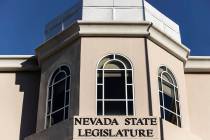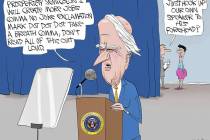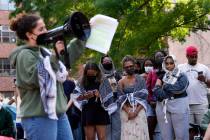Uber latest victim of protectionism
Armed government agents wearing bulletproof vests, some with black ski masks, cornering a vehicle on a public street. In most big cities, such a scene might transpire during a hostage-rescue mission or the apprehension of dangerous criminals. In Las Vegas, though, it could just be the taxi police.
Michael Elsner found this out the hard way. Elsner signed on as a driver for Uber, the ride-sharing company, as it prepared to launch its service in Las Vegas late last month. When he attempted to drop off his first customers on Oct. 24, he found himself confronted by undercover officers from the Nevada Taxicab Authority who surrounded his Ford Focus and eventually impounded the vehicle, their quarry in the paramilitary sting operation.
The Taxicab Authority maintains that Uber is operating illegally in Nevada, flouting state laws regulating cabs and limousines. Officials with Uber, which uses a smartphone app to match ride-seekers with willing drivers and has flourished in scores of other cities across the country, argue that the company simply offers a technology platform and is not a transportation business as traditionally defined.
Until last week, the company continued to do business and the Taxicab Authority continued to confiscate vehicles and cite drivers — at least 50 face fines of up to $10,000. But on Tuesday, a Washoe County judge ruled against Uber, issuing a preliminary injunction preventing the company from operating in Nevada. The issue likely will end up in front of the state Supreme Court, but regardless of how the legal arguments play out, this spectacle undermines the state’s narrative of projecting a business-friendly climate eager to welcome high-tech entrepreneurs.
It does, though, present an opportunity for Nevada lawmakers to revisit the hidebound regulatory provisions swaddling entrenched transportation interests at the expense of economic liberty, technological progress and consumer preference. It offers a chance for the Legislature to re-examine scores of occupational licensing and statutory requirements that have only a flimsy link to consumer protection, instead serving to shelter incumbent providers from competition while driving up costs, limiting choice and discouraging innovation.
A comprehensive 2012 study by the Institute for Justice, a public interest law firm, placed Nevada “among the top tier of most broadly and onerously licensed states.” In addition to the oppressive statutes governing the Las Vegas limousine and taxicab industries — which include an absurdly protectionist provision demanding that potential entrants show they will not “adversely affect other carriers” — Nevada features pages of laws that in effect limit entry into scores of jobs and vocations, including interior design, cabinet making, floor sanding, taxidermy, landscaping, cosmetology and makeup artistry.
Not only are these statutory requirements often arbitrary, inconsistent and irrational — it takes more class time to become a hairdresser or masseuse in Nevada than it does to become an emergency medical technician — they also fall disproportionately on men and women who can least afford an unnecessarily lengthy and expensive training process. Licensing fees that can reach thousands of dollars and expensive, time-consuming classroom demands that are often only tangentially related to the occupation in question are very real obstacles to many low- or middle-income job seekers who simply seek to support their families and earn an honest living.
Few people would argue against rigorous state oversight of doctors or nurses or other professionals directly connected to public health and safety. But is it truly necessary to protect consumers — beyond laws involving fraud or theft — from the dangers of lip pencils, gaudy window treatments or ride-sharing apps? Does forcing a potential Nevada travel guide to pay $1,500 in fees and undergo two years of training really make the state safer?
And do not forget that many of these employment barriers exist more as a tribute to the lobbying and financial clout of trade organizations intent on limiting fledgling enterprises than as a reflection of concern for the public welfare. It’s no coincidence, for instance, that the fingerprints of the Las Vegas cab and limousine cartel — through legendary superlobbyist Harvey Whittemore, now doing time in prison for illegal federal campaign contributions — are all over the very same statutes now being used by the industry to try to slam the brakes on Uber.
Gov. Brian Sandoval has repeatedly emphasized his commitment to job creation and economic development. It’s time “to leave the limits of the past and consider the case of our state’s future anew,” he said during his 2013 State of the State Address. Sandoval could take a big step toward doing precisely that by urging lawmakers to unleash the creative power and economic potential of thousands of Nevadans by trimming back the dense regulatory brush that has grown far in excess of legitimate concerns about health and safety.
Las Vegas resident John Kerr, former editorial page editor of the Review-Journal, is a communications fellow with the Institute for Justice, a public interest law firm in Arlington, Va.























